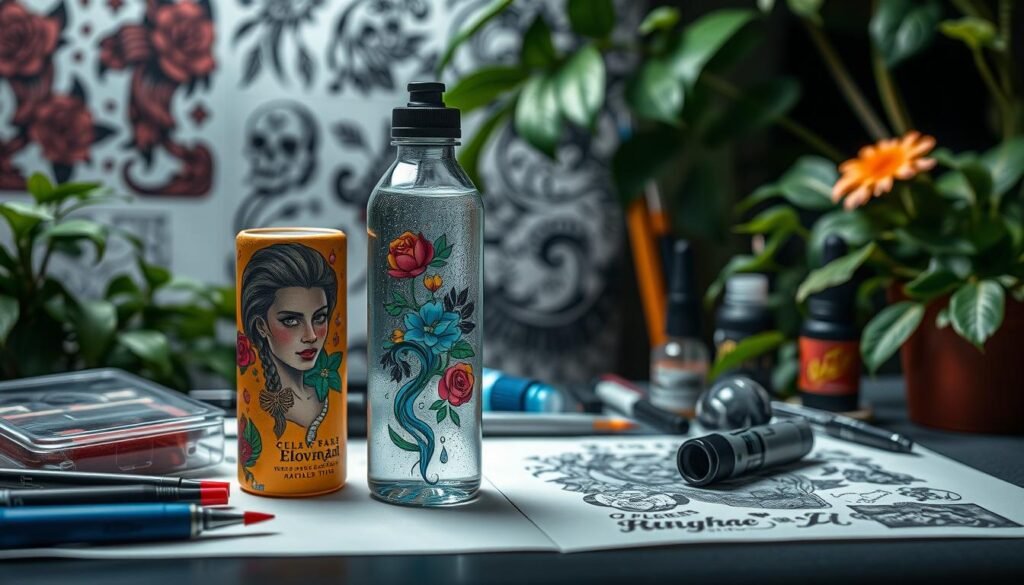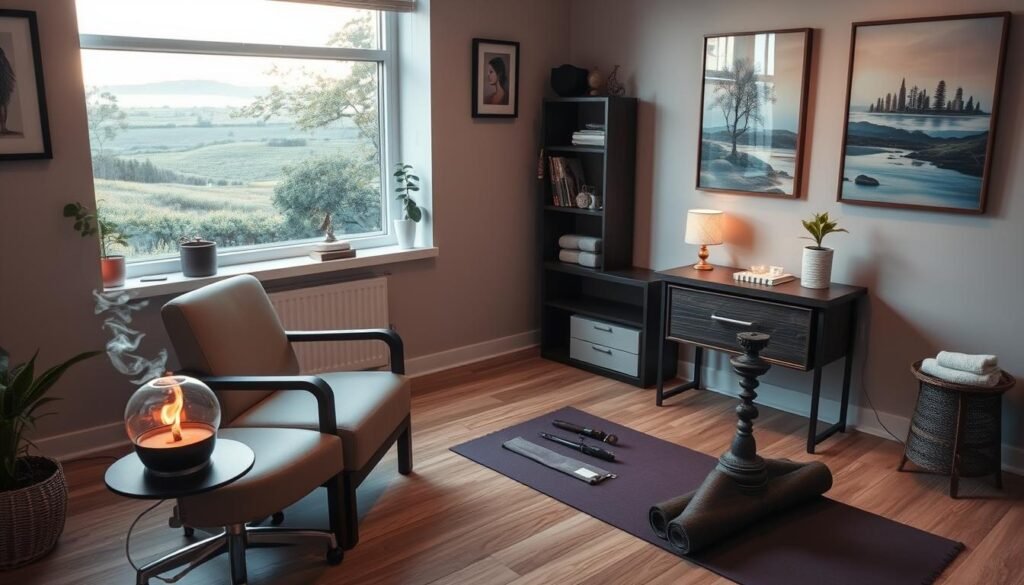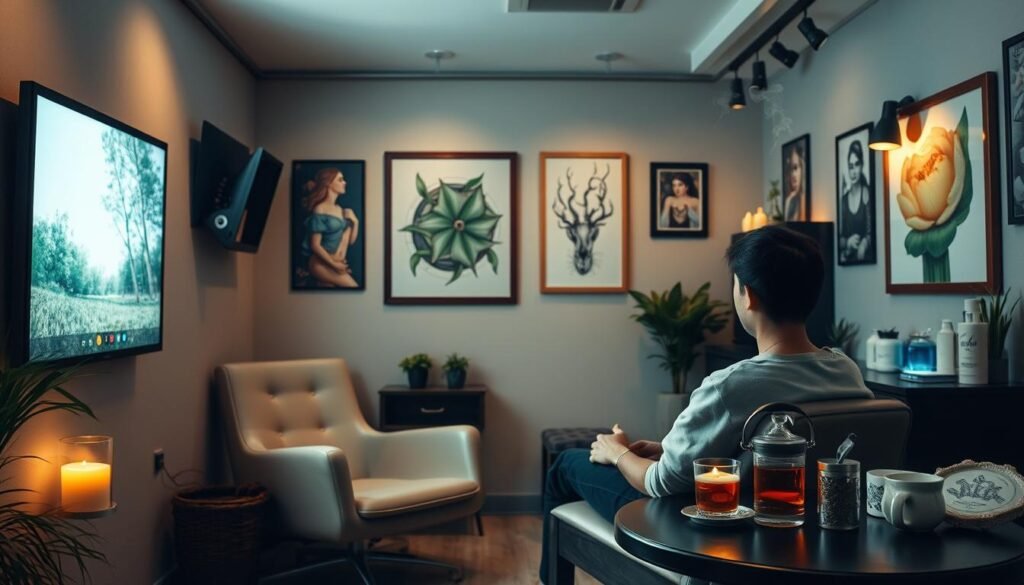Did you know body parts feel pain differently when tattooed? For instance, tattooing the outer forearm and shoulder hurts less compared to the face and inner wrist. The idea of sitting through a long tattoo session, up to 8 hours, triggers anxiety in many people. However, there are effective ways to manage this anxiety, making the experience calmer and more enjoyable.
Exploring various methods can ease tattoo anxiety. This includes preparing well, using relaxation techniques, and talking with your tattoo artist. These tips aim to relieve the stress of getting a tattoo. So, if you’re planning your next tattoo, these suggestions will help you remain calm and focused.
Key Takeaways
- Anxiety from the fear of pain can be reduced with proper preparation.
- Relaxation techniques and visualizing positive outcomes can lessen tattoo anxiety.
- Talking to your tattoo artist can offer a welcome distraction.
- Being hydrated and rested boosts comfort during long sessions.
- Using breathing exercises helps soothe nerves while getting tattooed.
Understanding Tattoo Session Anxiety
Tattoo session anxiety is something many people face when they think about getting body art. It’s important to understand that several factors can cause these feelings. Around 30% of folks feel anxious before their first tattoo.
People often worry about how much the tattoo will cost. They also fear the pain from the needle, the tattoo’s permanence, and what others will think.
What Triggers Anxiety During Tattoo Sessions?
Different things can trigger anxiety during tattoo sessions. These are some common concerns:
- Fear of Pain: The worry about the discomfort of getting a tattoo is common.
- Permanence Concerns: Thinking about how long the tattoo will last can cause doubts, especially for newbies.
- Needle Phobia: Being scared of needles is a big source of anxiety for many.
- Unfamiliarity: Not knowing what to expect can make first-timers extra nervous about the process.
The Relationship Between Anxiety and Pain Perception
The link between feeling anxious and how we perceive pain is important. Anxiety can make pain feel worse. This happens because of a faster heart rate and tense muscles. That’s why it’s key to deal with these anxious feelings.
Using strategies like deep breathing can help make the tattoo session easier. Talking with the artist and looking into pain relief options is also helpful. Research supports using relaxation methods to handle anxiety and pain better.
Preparing your skin well, like making sure it’s hydrated, adds to comfort. Many tattoo artists use numbing sprays to ease anxiety and reduce pain. Knowing these strategies helps in managing any tattoo-related nerves.
| Trigger | Description | Coping Strategy |
|---|---|---|
| Fear of Pain | Apprehension about physical discomfort during the tattoo process. | Discuss pain management options with the artist. |
| Permanence Concerns | Questions about the lasting nature of the tattoo. | Consider temporary tattoos before committing to a permanent one. |
| Needle Phobia | Heightened anxiety due to fear of needles. | Bring a friend for support and distraction. |
| Unfamiliarity | Nerves stemming from the unknown aspects of getting a tattoo. | Research the tattoo process and artist beforehand. |
Importance of Preparation for Your Tattoo Appointment
Getting ready mentally for tattoos makes the whole experience better. It lessens stress and gets your body ready. Knowing the right steps leads to a comfortable tattoo session.
Getting a Good Night’s Sleep
Sleeping well before your appointment is key. A rested body handles stress better. Try for 7-8 hours of sleep to help your mind and body recharge.
People who are mentally prepared feel less worried. They can enjoy the artistic side without thinking much about the pain.
Eating and Staying Hydrated Before the Session
Eating a balanced meal beforehand is crucial. It keeps your energy and mood up. Protein and healthy fats keep your blood sugar stable, which helps you feel good.
Drinking plenty of water before your tattoo is also key. Aim for at least eight 8-ounce glasses of water the day before. This keeps your skin ready and helps avoid discomfort during the tattoo process.

Avoid alcohol and hard exercise before your tattoo. These things help you stay in the best shape for your tattoo. Taking care of your skin by moisturizing helps the ink stay better and heals nicely. This makes your tattoo experience the best it can be.
Coping with Anxiety During Tattoo Sessions
It’s totally normal to feel anxious before getting a tattoo. Luckily, there are several ways to handle it well. Techniques like slow, deep breathing can significantly help. They can lower anxiety by up to 40% during your tattoo session. This helps you stay calm and ready for your tattoo.
Relaxation Techniques to Implement
Focus on breathing slowly and deeply. This helps you think less about the tattoo process. Turning on soothing music or holding a stress ball can also help you relax. These methods make the tattoo experience more comfortable. By using these techniques together, discomfort becomes easier to manage.
Positive Visualization Strategies
Positive visualization is another great way to deal with tattoo anxiety. Imagine peaceful places or view the tattoo process as a positive journey. This technique can reduce pain by 25%. Imagine your tattoo’s final look to stay excited and calm during the session. Communicate with your tattoo artist to make things go smoothly. For more tips, check out this article on coping techniques.

Using relaxation and positive visualization techniques can improve your tattoo experience. Prepare mentally to feel more confident and enjoy your new art. Many people focus on the joy of revealing their story through body art, beating their anxiety. For inspiration, consider anxiety-breathe symbol tattoos that symbolize resilience. Find more about meaningful designs here anxiety symbols.
Distraction Methods to Ease Anxiety
Managing tattoo anxiety can be easier with distracting techniques during tattoos. These strategies make the process less scary and more fun. Talking with your tattoo artist is a good way to distract yourself. Chatting about the design, sharing stories, or making jokes can make things feel more friendly. This helps lower stress levels a lot.
Engaging in Conversation with Your Tattoo Artist
Talking with your tattoo artist makes you feel at ease. This bond helps take your mind off the needle’s prick. Learning about the artist’s thoughts on tattooing and their stories builds trust.
Using Music or Podcasts for Distraction
Music or podcasts are great for calming methods for tattoo appointments. A playlist of your favorite tunes or interesting podcasts can capture your attention. Those who listen to music or intriguing podcasts feel less pain. This approach adds a personal vibe to getting a tattoo.

| Distraction Technique | Effectiveness in Reducing Anxiety |
|---|---|
| Conversation with the Tattoo Artist | High – Fosters trust and alleviates discomfort |
| Listening to Music | High – Engaging tunes can divert focus from pain |
| Podcasts | Medium – Particularly if they are captivating |
| Guided Meditation | Medium – Helps maintain calmness and focus |
| Positive Visualization Techniques | Medium – Shifts mindset towards a more positive outlook |
Breathing Techniques for Calmness
It’s very important to handle anxiety well during a tattoo session. Using good breathing techniques can make a big difference. They help you stay relaxed. Knowing how to breathe the right way is useful. It eases stress quickly and also helps with anxiety over time.
Practicing Deep Breathing Exercises
Deep breathing is key for a calm mind. Try inhaling deeply through the nose for a count of four, then hold for four. Exhale through the mouth for four. This can calm your nerves. It helps you focus on your breathing instead of the pain, making tattoos easier to get.
Incorporating Mindfulness and Meditation
Mindfulness helps you feel calm during a tattoo. It teaches you to accept what you’re feeling. This helps reduce fear. Before getting a tattoo, meditating can lower your anxiety. For help with meditation, check out these guidelines.
Physical Comfort for Reducing Stress
Making sure you’re comfortable during tattoo sessions really lowers stress. Dressing in comfy clothes for your tattoo appointments makes the whole experience better. Wearing the right outfit lets you move easily and keeps you focused.
Dressing Comfortably for Your Appointment
It’s smart to choose clothes that are loose. Clothes that breathe make you feel more at ease. When you’re comfortable, you can concentrate more on the tattoo and worry less about any discomfort or nerves.
Utilizing Temperature Control (Layers & Blankets)
Tattoo places can be hot or cold. Wearing layers or having a light blanket makes you feel secure and warm. Keeping your body temperature just right is key to staying comfortable during the tattoo. This way, you’re not distracted by feeling too cold or uneasy.
| Comfort Aspect | Description |
|---|---|
| Clothing | Loose-fitting, breathable fabrics reduce discomfort and allow freedom of movement. |
| Temperature Control | Using layers or blankets helps regulate body warmth, essential for comfort. |
| Relaxation | Feeling physically at ease aids in managing anxiety, contributing to a smoother experience. |
Overcoming Tattoo Fear with Positive Affirmations
Managing anxiety during tattoo sessions can improve with positive affirmations. These help shift thoughts from fear to empowerment. Simple mantras are key tattoo fear coping strategies. “This is temporary” and “I am strong” keep people reminded of their strength. This makes the tattoo process more positive.
Using Mantras to Shift Your Mindset
Repeating positive affirmations helps lessen anxiety. People getting tattoos might feel their heart race or start sweating. Affirmations can fight these feelings. Adding positive affirmations for anxiety to daily life builds confidence. This makes going to the tattoo studio easier.
Focusing on the Temporary Nature of Pain
Knowing tattoo pain is brief helps beat tattoo anxiety. During a session, remember discomfort fades fast. This eases fear. A mantra about pain being temporary shifts focus. It lets people enjoy the experience. Soft lighting also makes the setting calmer. This approach shows it’s a part of their journey, helping in positive interactions with the tattoo artist.
Building a good relationship with your tattoo artist helps too. Being open about anxiety is vital. Using these methods creates a better tattoo adventure. This leads to a fulfilling result.
Those interested in learning about trauma and resilience can look here for more: essential link.
Consulting with Your Tattoo Artist for Support
Talking openly with your tattoo artist can really help with tattoo nerves. This communication is key for addressing any fears and making the experience more comfortable. When you talk about your worries beforehand, artists can provide comfort, insights, and special support to lessen your fears.
Discuss Your Anxiety Concerns Ahead of Time
Sharing your feelings and worries with the artist creates a supportive vibe, critical for easing pre-tattoo nerves. It helps the artist tailor their approach, use calming techniques, and ensure the environment is welcoming during your session.
Choosing a Design and Location That Suits You
Choosing the right tattoo design and location is also crucial. Select something that feels right for you. This choice can ease anxiety, especially if it’s your first tattoo. Knowing which body areas might hurt more helps you make informed decisions about design and where to place your tattoo.
| Body Area | Pain Level | Recommendation |
|---|---|---|
| Outer upper arm | Low | Good for beginners |
| Forearms | Moderate | Consider for larger designs |
| Ribcage | High | Choose carefully for smaller designs |
| Ankles | High | Not recommended for first-timers |
Conclusion
Dealing with anxiety during tattoo sessions is a journey that needs careful planning and use of distraction techniques. It’s important to focus on staying calm. Using these strategies can help lower your stress and make the tattoo experience more fun. Getting enough sleep, drinking water, and eating well also help your body handle the stress better.
Talking openly with your tattoo artist is key to managing tattoo anxiety. Sharing your worries before the session lets the artist adjust their method. This thoughtful planning makes you enjoy the tattoo more and regret less later on.
Tattoos tell our personal stories and feelings. By using coping strategies, the fear of getting a tattoo turns into a moment of healing. These strategies don’t just help with tattoos. They also help you understand yourself better and handle stress in other parts of life.